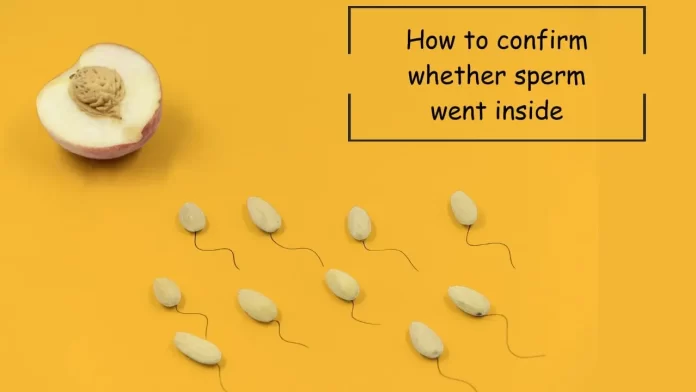When engaging in sexual activity, it’s common to wonder if sperm has entered the vagina or if there is a possibility of pregnancy. Confirming whether sperm has entered the vagina can help alleviate concerns or inform decisions about contraception and pregnancy prevention. While it is not possible to visually confirm the presence of sperm, there are some signs and precautions one can take to assess the likelihood of sperm entering the vagina. This article aims to provide information on How to confirm whether sperm went inside? and offers guidance on what to do in such situations. It is important to note that for precise and accurate confirmation, consulting with a healthcare professional is recommended.
What methods can be used to verify whether sperm has entered the vagina?
How to confirm whether sperm went inside? to determine whether sperm has entered the vagina, there is no foolproof method for immediate confirmation. However, you can consider the following steps:
- Assess the circumstances: If there was unprotected sexual intercourse and ejaculation occurred inside the vagina, there is a possibility of sperm entering.
- Monitor menstrual cycle and symptoms: Pay attention to changes in your menstrual cycle or any early signs of pregnancy such as breast tenderness, nausea, or missed periods.
- Take a pregnancy test: If you suspect pregnancy, taking a home pregnancy test after a missed period can provide a reliable indication.
For definitive confirmation or further guidance, it’s advisable to consult a healthcare professional.
How can I tell if sperm entered the vagina?
Determining whether sperm has entered the vagina can be challenging as it is not possible to visually confirm their presence. However, there are a few factors and signs you can consider to assess the likelihood:
- Ejaculation: If your partner ejaculated near or in the vicinity of the vaginal opening, there is a possibility that some sperm may have entered.
- Sensations: Some individuals may feel a warm or wet sensation during ejaculation, indicating the possibility of sperm entering the vagina. However, this sensation alone is not a definitive confirmation.
- Pregnancy risk: If you engaged in sexual activity without contraception or experienced a contraceptive failure, the risk of sperm entering the vagina and leading to pregnancy increases.
- Timeframe: Sperm can survive in the female reproductive tract for up to five days, but their viability decreases over time. If intercourse occurred within a few days of ovulation, the chances of sperm reaching an egg and fertilizing it are higher.
It’s important to remember that these indicators are not foolproof methods of confirming whether sperm entered the vagina. If you are concerned about pregnancy or need accurate confirmation, it is recommended to consult with a healthcare professional.
They can provide guidance, perform pregnancy tests, and discuss suitable contraceptive options or emergency contraception if needed.
What are the signs that sperm has gone inside during sex?
Determining whether sperm has entered the vagina during sexual activity can be challenging as it is not possible to visually confirm their presence. However, there are a few signs that can indicate the possibility:
- Ejaculation: If your partner ejaculates near or in the vicinity of the vaginal opening, there is a higher likelihood that some sperm may have entered.
- Sensations: Some individuals may experience a warm or wet sensation during ejaculation, which may indicate the possibility of sperm entering the vagina. However, it is important to note that this sensation alone is not a definitive confirmation.
- Leakage: If you notice any semen or fluid leaking out of the vagina after intercourse, it suggests that sperm may have entered. However, this does not guarantee that fertilization has occurred.
It is important to remember that these signs are not definitive proof that sperm has entered or that fertilization has taken place. If you are concerned about pregnancy or need accurate confirmation, it is recommended to consult with a healthcare professional. They can provide guidance, perform pregnancy tests, and discuss suitable contraceptive options or emergency contraception if needed.
Without a pregnancy test how to confirm whether sperm went inside?
No, there is no reliable way to confirm if sperm has entered the vagina and fertilization has occurred without taking a pregnancy test. Pregnancy tests detect the presence of a hormone called human chorionic gonadotropin (hCG), which is produced by the developing embryo after fertilization. These tests provide a more accurate indication of pregnancy.
While some signs or symptoms may suggest the possibility of sperm entering the vagina, such as ejaculation near the vaginal opening or experiencing a warm or wet sensation, they are not definitive confirmation of fertilization or pregnancy. These signs can also be subjective and may vary from person to person.
If you suspect that sperm may have entered the vagina and you are concerned about pregnancy, taking a pregnancy test is the most reliable way to confirm or rule out pregnancy. Pregnancy tests are readily available over-the-counter at pharmacies or can be conducted at a healthcare professional’s office. They provide accurate results by detecting the presence of hCG in urine or blood.
If you have concerns or questions about your specific situation, it is advisable to consult with a healthcare professional who can provide appropriate guidance, perform necessary tests, and discuss suitable contraceptive options or emergency contraception if needed.
What precautions can I take to prevent sperm from entering the vagina?
To prevent sperm from entering the vagina and reduce the risk of unintended pregnancy, there are several precautions you can take:
- Contraception: Use effective contraception consistently and correctly. Options include barrier methods such as condoms (male or female), hormonal methods like birth control pills or patches, intrauterine devices (IUDs), contraceptive implants, or contraceptive injections. Consult with a healthcare professional to determine the best contraceptive method for your needs.
- Condoms: If you are relying on condoms for contraception, ensure they are used correctly and that they are intact before each use. Use a new condom for each act of intercourse to prevent the risk of sperm entering the vagina.
- Emergency contraception: In cases of contraceptive failure or unprotected intercourse, consider using emergency contraception as a backup option. Emergency contraception, such as the morning-after pill or copper IUD, can be effective in preventing pregnancy if used within a specific time frame after intercourse. Consult with a healthcare professional for guidance and access to emergency contraception.
- Communication: Discuss contraceptive options and family planning with your partner. Open communication and mutual understanding can help ensure both partners are on the same page and taking necessary precautions to prevent unintended pregnancy.
- Education and awareness: Stay informed about reproductive health, contraception methods, and their proper usage. This knowledge empowers you to make informed decisions and take necessary precautions.
- Regular check-ups: Schedule regular check-ups with a healthcare professional to discuss contraceptive needs, evaluate effectiveness, and address any concerns or questions you may have.
Remember, no contraceptive method provides 100% protection against pregnancy or sexually transmitted infections (STIs). It is important to use contraception consistently and correctly and to consult with a healthcare professional for personalized advice and guidance on contraceptive options.
How long does Sperm Survive Outside the Body?
Sperm can have varying survival times outside the body depending on the conditions and environment. In general, sperm typically have a limited lifespan once outside the body. Here are some general guidelines:
- On surfaces: On surfaces such as bedding, clothing, or other non-fertile materials, sperm survival is usually brief. Sperm exposed to air and dry conditions will typically die within a matter of minutes to hours.
- In fluids: In a wet environment, such as semen or other body fluids, sperm may have a longer survival time. Sperm can potentially survive for a few hours in a moist environment like a bath, hot tub, or pool water.
- In reproductive fluids: Sperm that enters the female reproductive tract, such as during sexual intercourse, can have a longer lifespan. Once inside the vagina, the cervix, or the uterus, sperm can survive for up to five days under favorable conditions. However, the majority of sperm will usually die within the first 24-48 hours.
It’s important to note that the ability of sperm to fertilize an egg decreases significantly as time passes outside the body. Factors such as temperature, pH levels, and exposure to air or substances (like lubricants) can also affect sperm viability.
If you are concerned about fertility or the risk of pregnancy, it’s always best to take precautions, such as using contraception, to prevent unintended pregnancy. If you have specific questions or concerns about sperm survival, fertility, or pregnancy risk, it is recommended to consult with a healthcare professional for personalized advice and guidance.
Frequently Ask Questions FAQs
Q: Can I visually confirm if sperm went inside the vagina?
A: No, it is not possible to visually confirm the presence of sperm in the vagina. Sperm cells are microscopic and cannot be seen with the naked eye.
Q: Are there any home tests available to confirm if sperm entered?
A: Currently, there are no home tests specifically designed to confirm the presence of sperm in the vagina. The most reliable method for confirming sperm entry is through a pregnancy test if there is a concern about potential pregnancy.
Q: What signs or symptoms can indicate that sperm has gone inside?
A: While there are no definitive signs or symptoms to confirm the entry of sperm, some individuals may experience a warm or wet sensation during ejaculation, notice semen or fluid leakage after intercourse, or be aware of their partner’s ejaculation near the vaginal opening. However, these indicators do not guarantee fertilization or pregnancy.
Q: How accurate are pregnancy tests in confirming sperm entry?
A: Pregnancy tests are highly accurate in detecting the presence of the pregnancy hormone hCG, which is produced after fertilization. They can confirm whether sperm has successfully fertilized an egg. However, it is important to note that pregnancy tests should be taken at least a few days after the suspected exposure to allow sufficient time for hCG levels to rise.
Q: Should I consult a healthcare professional to confirm sperm entry?
A: If you have concerns about potential sperm entry, pregnancy, or reproductive health, it is advisable to consult with a healthcare professional. They can provide accurate information, perform appropriate tests if necessary, and offer guidance tailored to your specific situation.
Q: Can I rely on personal sensations or feelings to confirm sperm entry?
A: Personal sensations or feelings alone are not reliable indicators of sperm entry. Sensations during ejaculation or intercourse can vary among individuals and may not accurately reflect the presence or absence of sperm.









